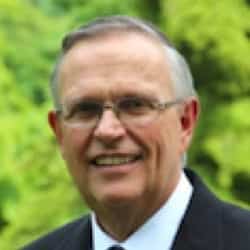https://vimeo.com/217577435
From #2 pencils to Chromebooks, in 40 years Dr. Tim Mills has seen it all
By Dr. Berger
The more I witness, the more I believe that one of the most underrated keys to career success is staying power. In many professions accolades are bestowed on individuals who rise through the ranks at a meteoric pace, only to burn out and eventually change professions.
Tim Mills is the complete opposite – he depicts longevity. Mills has worked in the education industry longer than most people have memories of any employment. Tim is currently Superintendent of Bellevue School District, located just across Lake Washington from Seattle. Tim’s stop at Bellevue is slated to be his last, as he has decided to retire after a stellar 40-year career.
When Tim started in education, technology in the classroom meant an overhead projector and an annual round of standardized test with a bubble sheet and a number two pencil. He has witnessed quite a change with the explosion of EdTech available today.
Mills is a believer in teachers as our number one assets in education. He echoes a theme I’ve heard time and again; technology is there to help teachers, not to replace them. Tim Mills makes it a point not to lose sight of that distinction.
So, congratulations to Tim, and all the best to wherever your next chapter takes you.
Interview
Dr. Berger: Tim, it’s really nice to spend some time with you. I think what’s compelling is that you’re completing forty years in education and retiring in June this year. I can’t help but wonder what goes through your mind as you not only celebrate what you have done but also the changes that you have witnessed over that period of time in education.
Tim Mills: It is amazing when you stop and think about it. When I decided to retire and recognize that this was my fortieth year, I looked back at ─ wow, where did all that time go?
The use of technology and how it has advanced so much of our work in many ways probably has been the most dramatic change that I’ve seen.
But, at the same time, it is the recognition that it’s still important to maintain the human relationship component that’s involved in education because this work is about people. Even with some great opportunities with technology, that personal interconnection is still critical.
DB: I think there are valuable lessons to be learned from your experience in this way. We are in a world now where we’re looking at reforming education at every turn, and either everything is wrong or we have too much data or we’re not doing it the right way.
I would think that the glass is half full, too. There are things that we have done over the last forty years that continue to be beneficial and there are longstanding efforts that we should continue.
With that as the backdrop, how do you think about and conceptualize all the change that people clamor for? Are we really focusing also on the good that we have that has been built on good resources and practice?

TM: I think we have to recognize that the value of the classroom teacher continues to be the constant. What we have seen that has evolved, certainly over my career, is the quality of the professional development for teachers and the ability to see student progress and to be able to calibrate that progress but, at the same time, to be always aware that teachers make a great difference in the lives of students.
I know from my administrative career for the past many years, my focus has always been making sure that we are getting the right type of support for teachers so that they can not only grow professionally but still have the greatest impact on students.
I think we don’t want to lose sight of how important that role of the teacher is as we’re doing the work for kids.
What I really think about is that all of us in our lives can look back and if we think about it, there are teachers who come to our minds who had an incredible impact on us. And it wasn’t necessarily all about the curriculum, but it was about how they established the relationship that encouraged us, the fact that they would believe in us, and inspired us to do as much as we possibly could.
I think that still exists and I think, oftentimes, we lose sight of that as we’re talking about changes that are necessary in education.
DB: I think we’ve lost sight or we’ve lost focus ─ and this is coming from the parent side of me, we were also talking about your role being a parent and a grandparent ─ on the lack of engagement and involvement over time that we have seen the American parent or parents and family take in their children’s education.
And I’m wondering, what can we be doing better to actively engage them in the process even if that means reform, but supporting not only their own children but also the teachers who are really the stewards of their learning on a day-to-day basis?
TM: I think one of the things that we can do as a school system ─ and I think this is done by school district by district, I don’t think there is any kind of a national or a state mandate for this ─ I think we have to determine how we do outreach to parents and how we create a climate of culture in our school buildings and in our districts that really invite and help parents understand how they can be connected to their children’s education.
I think we have to be thinking about that in terms of recognizing that many families are working multiple jobs and their lives are very busy. And so, how do we, as a school system, create opportunities to connect with these families in a way that’s authentic and encourages them to be supportive of their children?
I think that becomes an important part for us. Here in Bellevue, our school board, this year, as they were looking at what they were seeing as their top priorities as a school board in providing governance for our district, they identified three of their focus areas.
One was this notion of inclusion for all and what inclusion really means.
The second one is the idea of being very clear in growing our understanding and recognition of racial equity.
And then, the third was creating a culture of service.

In our community in Bellevue right now, our current students come from 124 birth countries from around the world. We have many families joining us here in Bellevue and this may be their very first experience in coming into a public school system in the United States. And we’re finding that we have to start determining how to better connect with those families to make sure they have that opportunity to support their children. But even more basic than that is to understand how the school system works.
DB: If you go back and you visit yourself as a young boy and you’re able to share that you’re going to spend forty years in education supporting the lives of young people and the professionals who are committed to supporting and developing young people in our country, what kind of advice would you have for the student version of you years ago when you were contemplating whether or not to even go into education?
TM: What I would be telling young people ─ and I do tell young people at this point ─ is you want to follow your passion. You want to do something that you believe will make a difference in the lives of others.
I was encouraged to pursue education both by my grandmother as well as the great educators that I worked with. They were able to help me see that through education, we really do make a difference. We have the opportunity in the classroom in our school districts to really be stewards of dreams for kids.
I can’t think of any place that we can work where there’s a better opportunity than to be doing that in education. So I would be encouraging students to pursue their dream which can be in a content area, but then recognize how they can transfer that work, that passion area, and make a difference in the lives of others through teaching and through education.
DB: So what’s next for you, Tim? I know that, probably, the title “Grandpa” is one that you hold dear and you’re going to be able to spend more time fulfilling that role. But what’s next?
TM: Certainly, that will be a part of it ─ being able to have a little more flexibility in my time with my wife and with my family. But I will be looking at volunteer opportunities. I will always be an educator. That’s just who I am. And so, I’ll look for other opportunities to where I think I can contribute.
Certainly, supporting our grandchildren as they start their public school career is a high priority for me and my wife.
DB: I know that we just met through this discussion but it goes without saying that the forty-year commitment to education and the betterment of young people is just incredibly commendable.
We just wish you all the best as you transition to this next phase. I have no doubt from what you’re saying today that it’s another chapter and you will continue to find ways to impact the community.
Thanks so much, Tim. Congratulations.
TM: Thank you very much. I appreciate talking to you.
About Dr. Justin (Tim) Mills
 Dr. Justin (Tim) Mills joined the Bellevue School District as Superintendent in July 2012. Prior to his role in Bellevue, Mills was Superintendent of the North Clackamas School District in Oregon—a district serving more than 17,000 students. Mills has also served as superintendent in the Mesa Valley County (22,000 students) and Brush Public School Districts—both in Colorado. Mills was the Colorado Superintendent of the Year in 2009. He served as a middle school principal and assistant principal in Mesa Valley County and began his career as a teacher in Colorado and Arizona.
Dr. Justin (Tim) Mills joined the Bellevue School District as Superintendent in July 2012. Prior to his role in Bellevue, Mills was Superintendent of the North Clackamas School District in Oregon—a district serving more than 17,000 students. Mills has also served as superintendent in the Mesa Valley County (22,000 students) and Brush Public School Districts—both in Colorado. Mills was the Colorado Superintendent of the Year in 2009. He served as a middle school principal and assistant principal in Mesa Valley County and began his career as a teacher in Colorado and Arizona.
Mills holds his bachelor’s and master’s degrees from the University of Colorado and his Ed.D from Nova Southeastern University.
Follow Bellevue Schools and Superintendent Tim Mills on Twitter
AuthorDr. Berger is one of many industry education correspondents for the Mind Rocket Media Group, An educator and former school administrator. His video interview work and conversational podcasts have been featured in various media outlets. He often hosts education panel discussions and develops strategic content. As an academic Dr. Berger is a guest lecturer at Vanderbilt University’s Owen Graduate School of Management. A former assistant principal, he has been an adjunct undergraduate professor and developer of online college courses. He is a passionate Detroit sports fan who has also adopted Nashville sports teams as his own.
Contact the Mind Rocket Media Group if you are interested in an industry interview and a placement on EdCircuit.
Further Reading
- Forbes – Don’t Write Off Teachers Just Yet — They Are More Important Than Ever
- EducationNext – Getting Past the Broken “Teachers vs. Technology” Debate
- Brookings – Choosing between teachers and technology
